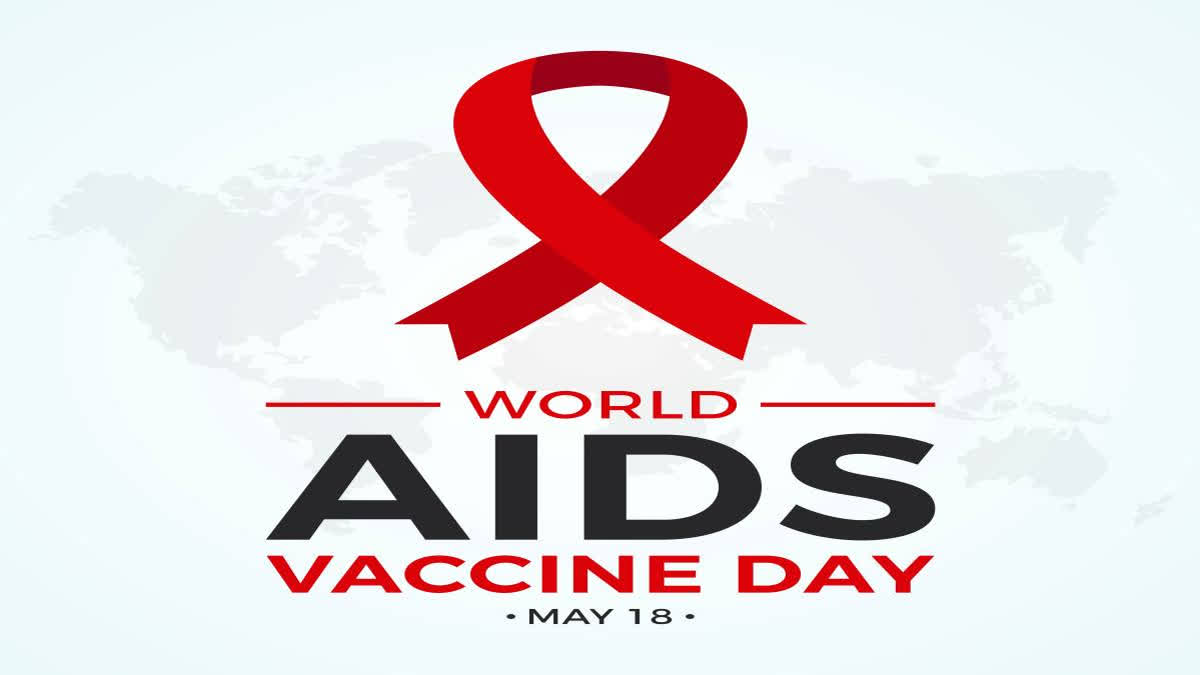New Delhi: Emphasising the need for raising awareness about acquired immunodeficiency syndrome AIDS/ HIV (human immunodeficiency virus) and to promote the development of an effective vaccine against the virus, the World AIDS Vaccine Day is observed on May 18. The day also recognises the contributions and consistent fight of healthcare professionals on vaccine research.
History of World AIDS Vaccine Day: It was May 18, 1997, when then US President Bill Clinton emphasised the critical need for an effective HIV vaccine during a public speech at Morgan State University. Clinton’s call to action set the stage for the inaugural observance of World AIDS Vaccine Day in 1998. The day primarily aims to educate people about HIV prevention and research for an AIDS vaccine, bringing attention to the ways in which individuals can be a part of the global effort to end this epidemic.
Significance: The World AIDS Vaccine Day gives an opportunity to raise awareness about HIV and to promote the development of an effective vaccine against the virus. The day serves as a reminder that the international community remains committed to fighting the epidemic and supporting people living with HIV.
Vaccine Prospect: Despite substantial progress in research and treatment, there is still no cure for HIV/AIDS which is often described as a “silent epidemic.” Antiretroviral drugs, which suppress viral replication in the body, are the primary means of managing the disease till date. According to the World Health Organisation (WHO), the emergence of acquired resistance to Dolutegravir (DTG)-the preferred antiretroviral drug is higher than anticipated, reaching levels of up to 19 percent.
“DTG resistance amplifies the urgent need to implement standardized surveys to characterize the prevalence and patterns of DTG resistance mutations and their associated clinical determinants,” the WHO said.
However, health experts say that preventing HIV is crucial while awaiting an effective vaccine. “Strategies include abstinence, safe practices, Pre-Exposure Prophylaxis (PrEP), and Post-Exposure Prophylaxis (PEP). Educating communities and addressing stigma play vital roles in curbing new infections,” said Dr Tamorish Kole, renowned health expert and past president of Asian Society for Emergency Medicine.
Activities on World AIDS Vaccine Day: From educational campaigns to community events, the National AIDS Control Organisation (NACO) will organise different activities across India. The activities organised on World AIDS Vaccine Day aim to raise awareness, promote HIV prevention, and engage individuals in the global effort to combat the pandemic.
With an approximately 38.4 million people living with HIV globally, the virus continues to impact communities worldwide, particularly in regions with limited access to education, prevention measures, and medical treatment.
HIV/AIDS cases in India: As per latest data of NACO, with around 24.67 lakh people living with HIV (PLHIV), India has the second largest HIV epidemic in the world, accounting for around 6.3 per cent of all PLHIV worldwide. However, annual new infections between 2010 and 2022 declined by 42 per cent while annual AIDS-related deaths declined by 77 percent in India.
According to NACO, the HIV prevalence among the high-risk groups continues to be much higher than the overall adult prevalence. In comparison to the estimated national adult prevalence of 0.20 percent in 2022, the observed HIV prevalence among high-risk groups is 9-43 times with 1.85 percent among female sex workers (FSW), 1.93 percent among inmates in central jails, 3.26 percent among men who have sex with men (MSM), 3.78 percent among hijra/transgender (H/TG) persons and 9.03 percent among injecting drug users (IDU).
“Even among the migrants and truckers, the HIV prevalence is observed to be 4 times among single male migrants and five times among long-distance truckers than the national adult prevalence,” the NACO report said.
Can India find a vaccine for HIV/AIDS: According to Dr Kole, Pune based National AIDS Research Institute (NARI) has actively participated in HIV vaccine trials using both DNA-based and vector-based approaches. NARI achieved a significant milestone by conducting India’s first HIV vaccine trial. The initial phase involved an HIV-1 subtype C-based Adeno-Associated Virus (AAV) vector-based vaccine. Subsequently, a second vaccine trial followed, combining DNA vaccine (ADVAX) priming with a Modified Vaccinia Ankara (MVA) vector-based vaccine as a boost in a Phase I safety and immunogenicity trial.
“The NARI targets to achieve control of HIV spread and to provide care to the HIV infected population and strives for the achievement of zero new infections, zero deaths and zero discrimination towards AIDS patients. The NARI is working in direction to establish research initiatives that have an interface with intervention and policy development to prevent and control the spread of the HIV/AIDS epidemic,” said Dr Kole.



